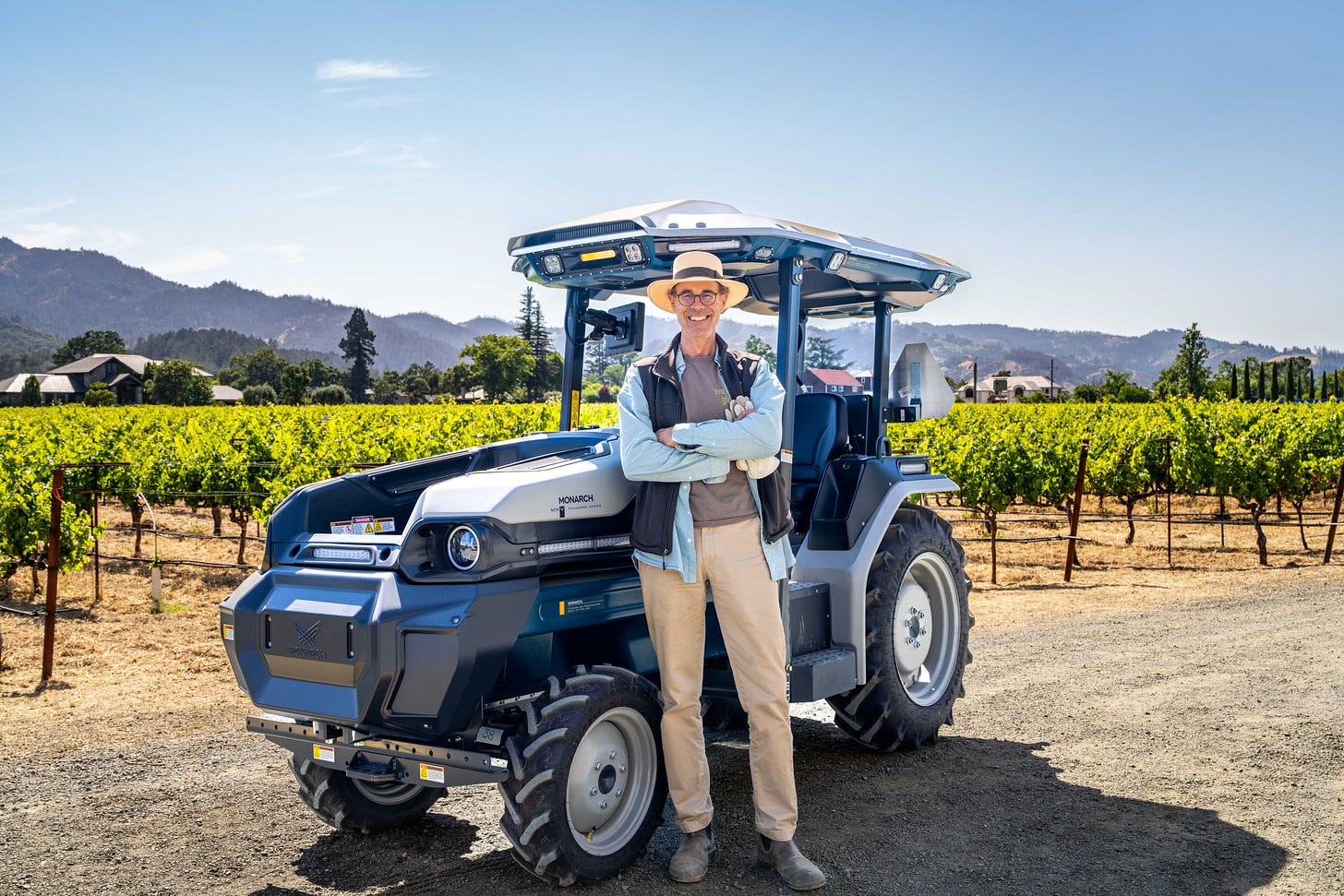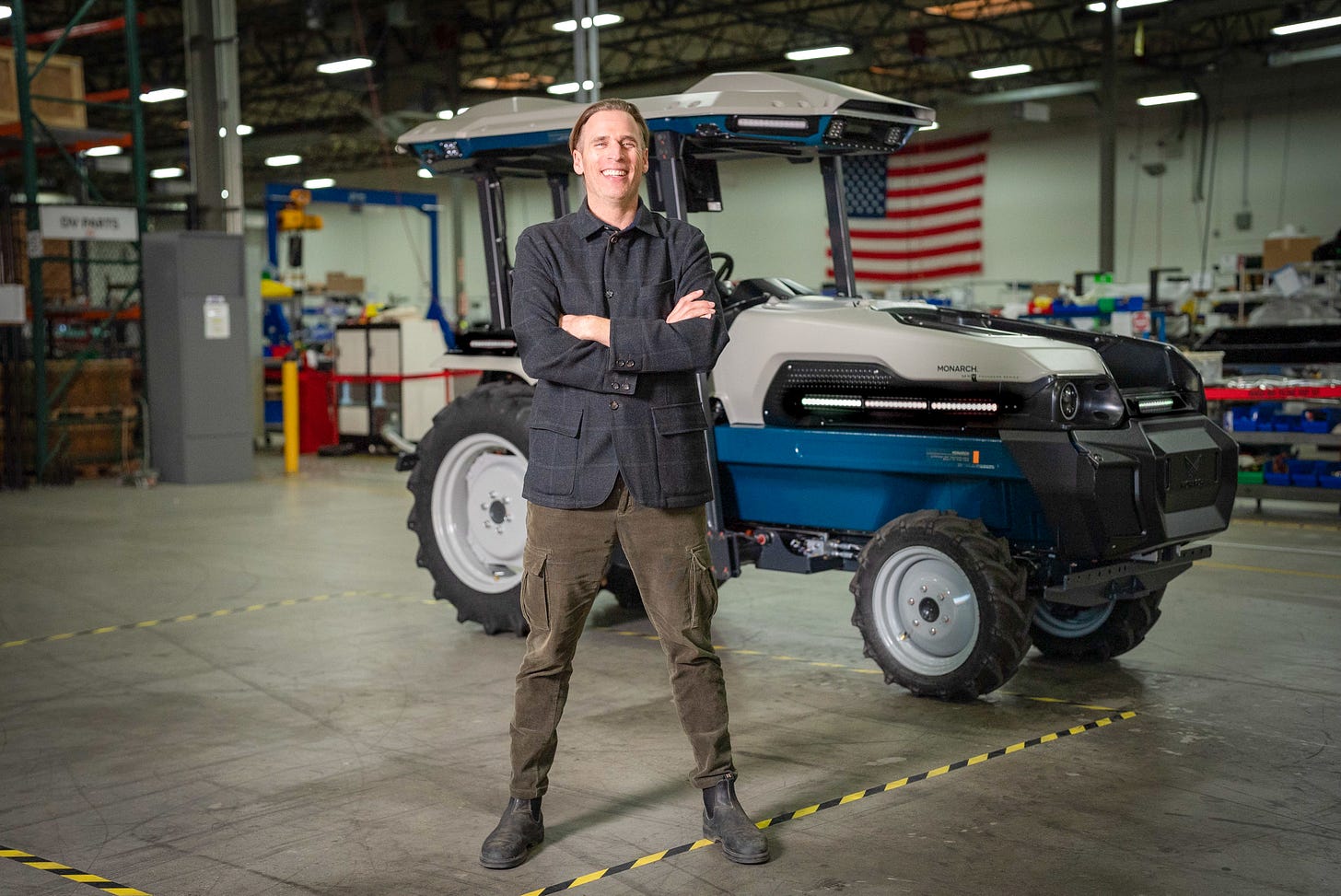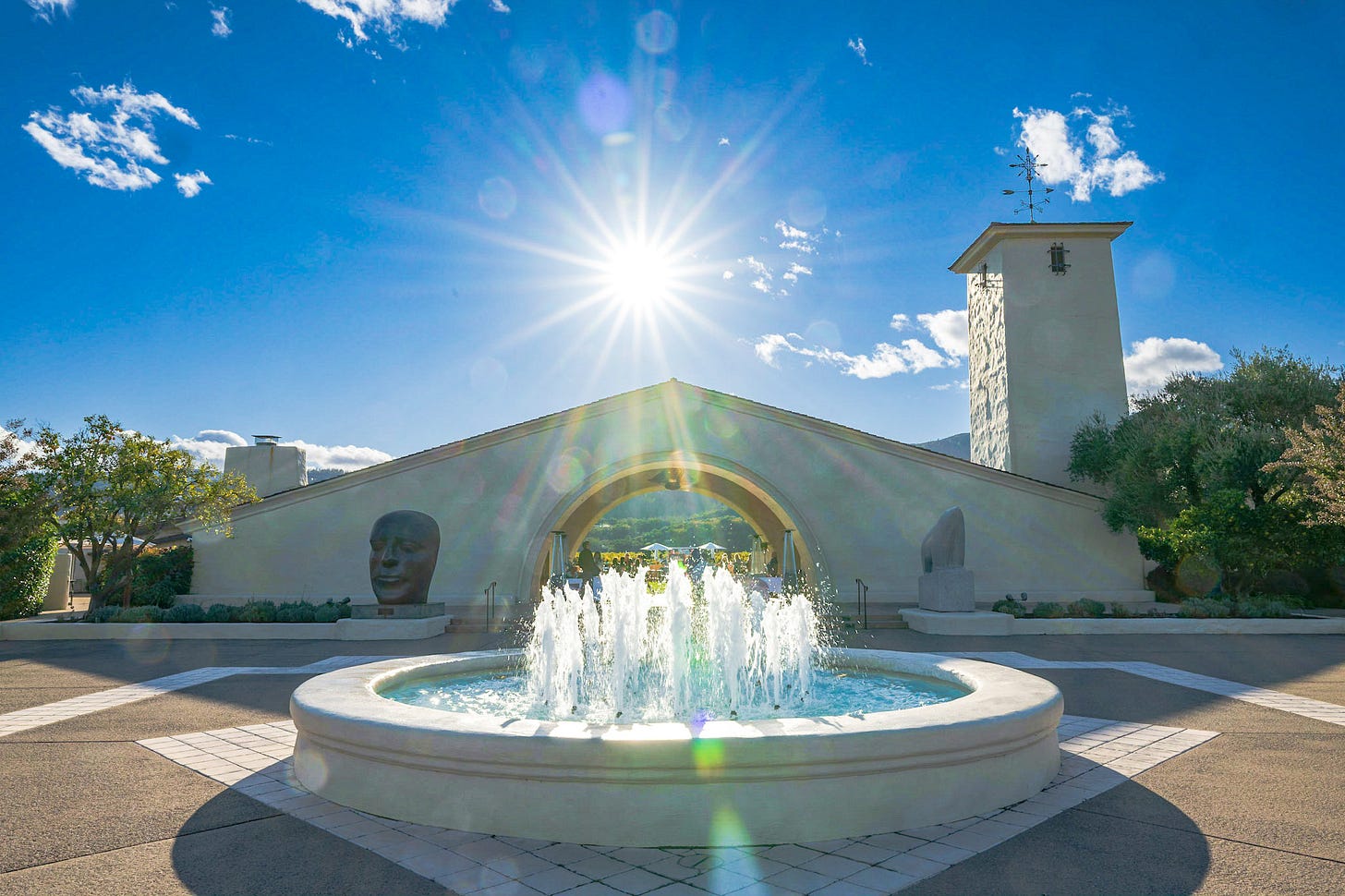In the lush vineyards of Napa Valley, known for its distinguished wines, a significant transformation is occurring. This shift, orchestrated by Carlo Mondavi along with his business partners, Praveen Penmetsa, Zachary Omohundro and Mark Schwager, aims to revolutionize farming by replacing traditional diesel-smoke-belching tractors with the Monarch Tractor — an innovative, ecologically sensitive electric alternative.
As the chief farming officer of Monarch Tractor and a fourth-generation vineyardist/winemaker, Mondavi contributes his extensive experience in organic, biodynamic and permaculture farming to drive the shift of agriculture from being a significant producer of carbon emissions to a carbon-neutral industry that will help combat climate change.
"Almost half of our habitable land worldwide is farmland, and nearly all of it utilizes tractors," Mondavi said. "Consider the impact if we could substitute all those tractors with zero-emission electric alternatives. The impact would be enormous. It will be enormous."
According to The New York Times, the global market for farm tractors is anticipated to reach $70 billion by 2027. To put that in perspective, by 2027 the worldwide market for automobiles is expected to reach nearly $600 billion.
If the Monarch team fulfills their objective, the current MK-V model will fundamentally change farming operations by offering an environmentally friendly alternative to traditional fossil-fuel-dependent machinery. However, the Monarch Tractor is not merely an ecofriendly option; it's a technological wonder. With its fusion of advanced artificial intelligence and autonomous driving capabilities, it fosters efficiency and precision in farming, leading to substantial cost reductions by eliminating fuel costs alone.
The Monarch team has dedicated significant time to refining their tractor for grape farming.

"Grape farmers in Napa Valley demand precision, error-free farming," said Schwager, the president of Monarch Tractor. "Demonstrating how effectively these machines perform in a vineyard like Corison or many others in the valley helps to provide anyone growing any crop with confidence in our tractor’s safety, effectiveness, cost savings and environmental friendliness."
Cathy Corison and her husband, William Martin, owners of Corison Winery, are known for their commitment to environmentally friendly farming practices. Their adoption of electric vehicles and equipment dovetails with their dedication to sustainable agriculture.
"Our goal is to become 100% electric," Martin said. "We recently received our first Monarch, and we plan to eventually replace our other tractors with them over time. They're remarkable in terms of their capabilities, even functioning as generators during power outages. They are also quiet."
Despite its significant upfront cost — MSRP of the MK-V is currently around $90,000, whereas an equivalent standard tractor might run anywhere from $25,000 to $75,000 — Monarch Tractors now qualify for a number of subsidy programs, including California's 2023 Clean Off-Road Voucher Incentive Project. This program offers financial support to farmers transitioning to cleaner practices, potentially reducing the MK-V's cost by up to 65% as farmers progress toward energy independence and zero-emission farming.
Although Carlo is leading the charge for environmentally friendly vineyard practices, the entire Mondavi family has had a significant impact on the American wine industry for more than a century.
The Mondavi wine legacy began with Cesare Mondavi and Rosa Grassi emigrating from Sassoferrato in Marche on the Adriatic coast of Italy to the United States in the early 20th century. Initially they opened a boarding house, saloon and grocery store in Minnesota, but a visit to California during Prohibition convinced Cesare to ship wine grapes back East so that home winemakers might make their own wines across the country.
Cesare and Rosa had four children, including Robert and Peter, who both played significant roles in the wine industry. Robert Mondavi, the eldest son, is often credited with bringing worldwide recognition to the Napa Valley wine industry. After he graduated with a degree in business from Stanford in 1937, he and his brother joined their father to purchase St. Helena’s Charles Krug winery in 1943.
Peter, who studied winemaking, advanced many innovative practices in the industry at the time, such as cold fermentation and the use of French oak barrels.
After a family dispute, however, Robert left in the mid-1960s to establish Robert Mondavi Winery, which became an icon of the California wine industry. A true trailblazer, Robert believed that American wines could compete with the best wines in the world.
Peter Mondavi stayed at Charles Krug and took over the family business after Cesare's death in 1959. Under Peter’s leadership Charles Krug Winery also gained a reputation for producing quality wines. Today it is being led by the third generation — Marc and Peter Jr. — and the fourth generation — Marc’s daughters, Angelina, Riana, Alycia and Giovanna, and Peter Jr.’s children, Lia and Lucio. 2023 represents 80 years of Mondavi leadership and winemaking at Charles Krug.
After the record-setting $1 billion sale of the Robert Mondavi Winery to Constellation Brands in 2004, Michael Mondavi, Robert’s elder son, with the help of his children, Rob and Dina, started a new winery called Michael Mondavi Family Estate, focused on Cabernets sourced from vineyards in Atlas Peak and Howell Mountain. They also launched Folio Fine Wine Partners, an import and distribution business, luxury wine import, marketing and sales company. His ventures further bolstered the Mondavi family's influential status in the Napa Valley wine industry.
Tim Mondavi, one of Robert Mondavi's three children, followed his father and grandfather into the winemaking business, too. Tim earned a degree in viticulture and enology from UC Davis and later became the winemaker and managing director at Robert Mondavi Winery. Tim was known for his innovations in winemaking and played a significant role in establishing the winery’s reputation for high-quality wines. He also was a driving force behind the development of Opus One, a joint venture between Robert Mondavi Winery and Baron Philippe de Rothschild of Château Mouton Rothschild.
After a series of corporate acquisitions and mergers, control of Robert Mondavi Winery passed out of the family’s hands in 2004. Tim and his sister, Marcia, then established Continuum Estate on Pritchard Hill and focused on producing a single Bordeaux-style blend.
Three of Tim’s five children, Dante, Carissa, and Chiara — the artist who designed the Continuum label — and Marcia’s son, Brian Mondavi Borger, are now actively involved in the estate. Dominic Mondavi is a designer not working with the family winery.
Tim’s other son, Carlo, is another of the fourth-generation Mondavis in the wine industry. Like his father and grandfathers, Carlo has a keen interest in innovation.
The Monarch Challenge
The Mondavi family history is inextricably woven into the fabric of Napa Valley's wine industry, contributing substantially to its global renown and success — from Charles Krug and Robert Mondavi's pioneering work in the mid-20th century, which revolutionized California wine production and elevated the region's reputation, to nearly all of the family’s being involved in the advancement and improvement of the local wine industry. Now Carlo, stepping into the sizable shoes of his predecessors, is driving this legacy to new frontiers. With initiatives such as the Monarch Tractor and his work with RAEN Winery (Research in Agriculture and Enology Naturally), Carlo is not just maintaining the Mondavi tradition of winemaking but expanding it by embedding sustainable, ecofriendly practices at its core, underscoring the Mondavi name as synonymous not only with premium wines but also with the future of sustainable viticulture.
Symbolizing a deep commitment to reducing the destructive impacts of chemical-reliant, fossil-fuel-based agriculture, the Monarch Tractor, aptly named after the endangered butterfly, stands as a symbol of Carlo Mondavi's environmental initiative, the Monarch Challenge. This initiative actively advocates for organic farming methodologies and ties into his and his brother Dante's efforts at RAEN Winery, a venture that underscores farming methods that go beyond the usual organic benchmarks.
"Many farmers have unfortunately drifted away from traditional farming methods that don’t depend on using chemicals and fossil fuels," Carlo said. "By reviving practices that our great-grandparents would recognize and integrating them with advanced technologies like the Monarch Tractor, we are in a position to pass on land to our children that is even better than when we inherited it. And that's beneficial for our local community and to improve wine quality but also serves as a potential model for other communities.”
Tim Carl is a Napa Valley based photojournalist.
Sasha Paulsen and Paul Franson contributed to this story.









The legacy of innovation and determination is alive in this generation! Great article!